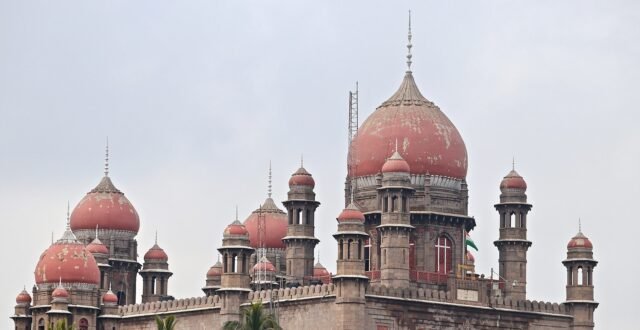The IAMC was envisioned as India’s first dedicated institutional hub for arbitration and mediation—an alternative legal framework aimed at easing the burden on traditional courts.

The Telangana High Court. (Wikimedia Commons)
Synopsis: The petitioners alleged that the state had handed over high-value public land to a private body without adhering to due process or established norms. They contended that the move lacked transparency and violated principles laid down by the Supreme Court.
In a landmark judgement, the Telangana High Court on Friday, 27 June, quashed the allocation of 3.5 acres of premium government land in Hyderabad’s Rayadurgam area to the International Arbitration and Mediation Centre (IAMC), citing violations of legal procedures and Supreme Court guidelines.
The verdict was delivered by a division bench comprising Justices K Lakshman and K Sujana, following hearings on two Public Interest Litigations (PILs) filed by advocates K Raghunath Rao and Venkatram Reddy.
The petitioners had challenged the previous Bharat Rashtra Samithi (BRS) government’s allotment of land in Survey No. 83/1 of Serilingampally Mandal—part of the city’s upscale IT corridor—to the IAMC.
Also Read: Former British PM Tony Blair lauds Telangana’s Vision-2047
Prime land
Valued at over ₹350 crore, the land parcel was granted through a Government Order issued under the BRS regime, headed by then Chief Minister K Chandrashekar Rao. The allotment was accompanied by a ₹50 crore grant for construction, and the foundation stone for the Centre’s permanent premises was laid on 11 March 2022, by the then-Chief Justice of India, Justice NV Ramana.
At the time, Justice Ramana had lauded the Telangana government’s initiative as a step toward modernising dispute resolution mechanisms in India.
The IAMC was envisioned as India’s first dedicated institutional hub for arbitration and mediation—an alternative legal framework aimed at easing the burden on traditional courts by resolving commercial and institutional disputes, both domestic and international.
Also Read: Telangana charts ambitious tourism push
Breach of norms
However, the land allotment soon drew criticism, with petitioners alleging that the state had handed over high-value public land to a private body without adhering to due process or established norms. The PILs contended that the move lacked transparency and violated principles laid down by the Supreme Court regarding the allocation of public resources.
In defense of the allotment, the Advocate General argued that the IAMC was a public-spirited institution designed to serve national interests by fostering efficient dispute resolution. He stressed that the Centre’s governing body included key public figures such as the Chief Justice of the Telangana High Court and the state’s law minister, ensuring accountability and credibility.
Reddy also underscored that state support—including land and financial assistance—was essential for nurturing a world-class arbitration institution in India.
Despite these arguments, the bench ruled in favor of the petitioners, declaring the land allotment illegal. The court found that the transfer violated procedural rules and ignored the binding directives of the Supreme Court concerning the use and distribution of public property.
(Edited by Majnu Babu).








